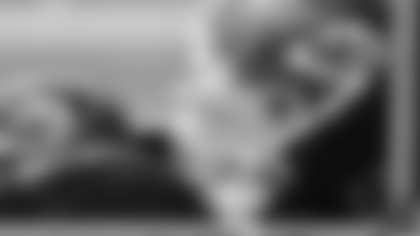OPENING STATEMENT:"I thought first I would go through a little bit of the NFL concussion protocol. I know it's out there, it's been on TV and it's been laid out for you. This is just a little bit of what goes on, on our sideline and how it came about.
"First off, that program and that protocol is a meticulous process in development. It was developed by neurosurgeons, neurologists and some of the top sports medicine physicians. It's basically a checklist. There are a couple layers of that checklist that you have to go through. The first part of it is on the sideline when a player has some kind of event that may appear to be a concussion. There's a certain set of five questions that our team physician and our unaffiliated neuro-trauma consultant (UNC) go through. That's called the 'Maddocks' test. Maddocks questions are five questions. If they clear those, you either decide to take that player inside, or you continue to figure out what's going on with that player. In Alex's case yesterday, in both episodes, he did fine on all five Maddocks questions. We decided to take him inside the first time because he had that stagger episode and he had a big laceration on his ear. The second time, it was because it was the second time we were asking him the questions and we just decided to take him inside. But both times he cleared the questions.
"Once you get them inside, there's a process that goes on with both the team physician and the unaffiliated neuro-trauma consultant. A lot of the process is on an iPad -- it's called 'SCAT3' which is developed worldwide by neurosurgeons. The 'SCAT' part of it stands for Sports Concussion Assessment Test and this is the third version of it. That's already downloaded to our iPads and every player on the roster has that test on a baseline. A team physician and a UNC went through that with Alex and both times he passed through it with a passing grade -- and he was fine.
"That test, just to give you a little idea, there's memory recall on it, there's balance, there's symptom questioning of the athlete, there's vestibular ocular motor stuff where they follow with their eyes and do some eyes and convergence testing. He got through that both times.
"With that, we don't think he had a concussion on either episode and I know there was some confusion with that yesterday. The confusion came from this: the first time we said he was returning after being in the protocol. The second time, he was in the middle of the protocol, we were in the middle of the game, and we wanted to let the media know that he wasn't coming back out. I said to Ted [Crews] that he was out with a concussion, when the reality of it was that he was out and he was in the middle of the concussion protocol. The other part of that protocol, including that SCAT, is that the UNC, the team doctor and/or myself has to review the video to see whether we see anything different than what the athlete is telling us. Whether we think he was unconscious even though he said he wasn't, we can look at the video. There's a lot of steps there and it takes 15-20 minutes to get there. The confusion there, when coach said he had passed both parts of that program, was that he was correct. The confusion came when I told Ted, 'Concussion - Out' and really it was he was 'Out' and he was in the middle of the concussion protocol, but we weren't going to return him in the same game.
"The third part of this whole process is the 'return to play' part of the protocol. Although we don't think he has a concussion, we're going to be cautious and we're going to take him through all those steps before we put him back on the field -- just to make sure we're not missing anything. Some of that 'return to play' protocol includes impact testing, he'll see an independent neurologist here in Kansas City before he returns to play, and he'll go through some various exercise bouts to make sure he's not getting any more symptoms.
"I can tell you this without getting too much into his stuff today, from last night on and certainly I was with him on the plane, I talked to him last night, Coach [Reid] talked to him on the phone and he's been in this morning, he's absolutely asymptomatic. And this is a player that had a concussion before and he knows he's missed time with it. He's aware of the situation. We're aware of the situation. He's doing very well but we're in the middle of the return to play protocol. A side note is, just so you understand just how that protocol works, Spencer Ware went through the protocol yesterday and never got out of the second phase. So when he did the 'SCAT' part of it, he didn't do well enough to return to play. It's a systematic checklist and every doctor on that sideline and every trainer on that sideline has been educated on it. We've done seminars as a group in the NFL, we've done webinars and we talk about it at all of our meetings. It's my job to make sure every man and woman on that sideline knows that protocol and they do. I thought they acted flawlessly yesterday. The only mistake in the whole thing yesterday was me telling Ted, 'Concussion' instead of 'In the middle of a concussion protocol'. I know it caused a lot of confusion and I'm sorry about that. With that, I'll take your questions."
Q:Just to be clear, you don't believe Alex Smith has suffered a concussion?
BURKHOLDER:"That's what the unaffiliated neuro-trauma consultant believes, that's what Dr. Monaco believes, that's what I believe, and that's where we're at now. He will see an independent neurologist here in Kansas City. I don't think that's going to change, but we'll defer to him as well because that's part of the Return to Play protocol. And that's why we have all those checks and balances in place."
Q:How much of the physical symptoms, the wooziness and disorientation effects, play into the concussion protocol?
BURKHOLDER:"It certainly does. That's why we took him inside. He passed the Maddocks questions and then we took him inside because of that. I'll give you an idea of how medicine works: If you go to the hospital because you have a chest pain, it doesn't mean you're having a heart attack. There's a lot of other things that could be going on. If you have a symptom, and you go in there, they check you out and sometimes they keep you over night. They keep you out until they're sure. I would say in any medicine, any injury you have, whether it's 'a concussion, sprain or anything like that, that happens. Our head coach allows us to be super cautious, the NFL is super cautious and our team doctors are educated that way. I think it does play into it. We take into account the big picture. We look at the video, we go back and look at the video. We talk to the referees, we talk to teammates, we do all of that."
Q:The Maddocks questions -- those are the ones that the players answer before the season?
BURKHOLDER:"No. That's in the SCAT3. The Maddocks questions are more like, 'Who did we play last week? What quarter of the game are we in? What time of day is it?'"
Q:Is it possible that Alex could A. Play on Sunday? B. Practice on Wednesday?
BURKHOLDER:"To answer your question, yes. We will go through the return to play protocol and see where he is at."
Q:Is it realistic?
BURKHOLDER:"The first question is better, 'Is it possible?' Yes it's possible."
Q:If he passed the protocol and you don't think it was a concussion, how do you square it away with how it 'looked on the field'?
BURKHOLDER:"Many of us in this room have experienced vestibular problems where we lose our balance from whatever -- whether it's inner-ear, a brief change in blood pressure, etc. We don't think it's any of those things. According to our testing of concussions, we don't think he had a concussion. We're not absolutely sure why he had those events. Maybe the independent neurologist could shed some light on that for us. We also want to see if exercise takes him back into a state where he gets a little more staggered. We also know the balance center is in your ears. He has a laceration on his right ear. He also has hematomas, which are fluid collections right behind both ears from separate events. We think maybe his helmet came down and hit him there when he was hit."
Q:The plastic on his helmet you think hit him?
BURKHOLDER:"He's got a lot of different stuff inside his helmet. He's got speakers and the padding which can be different in everyone's helmet. So we're not sure what gave him the hematoma, but he did tell me he's had it before."
Q:How confident are you that you're able to identify a concussion during a game within the limitations of the test?
BURKHOLDER:"That's a great question for the medical community. A whole group of world-wide neurosurgeons met last week -- and they change these guidelines all the time. I think it's a great question. I can't shed light on it. I can tell you that I trust Dr. Monaco and I do trust the unaffiliated neuro-trauma consultant. Those two guys who are absolute experts in the area felt he was fine to return to play the first time. The second time, they felt he passed through the protocol, but decided to hold him -- out of caution -- until we could do more today, tomorrow and that kind of thing. I know that doesn't directly answer your question, but in a way it does. You trust physicians. Just like I said about chest pains, you go into the hospital and you won't always get an immediate diagnosis, whether it was a heart attack or not a heart attack."
Q:Is it hard to give that clearance when dealing with a brain and knowing it's an imperfect test?
BURKHOLDER:"Any medicine is not an exact science. That's why we constantly study it and go to these seminars and change why protocols change for every injury, including concussions. I'll tell you this: working for this organization, this head coach and this medical staff, we worry a lot about our players. I've got to tell you, yesterday was not a fun day for me because we were making those decisions. But, I trust our medical staff, I trust the NFL's medical system and I trust those independent neuro-trauma consultants. That's how I've got to go about doing my job and I have no problem with that."













